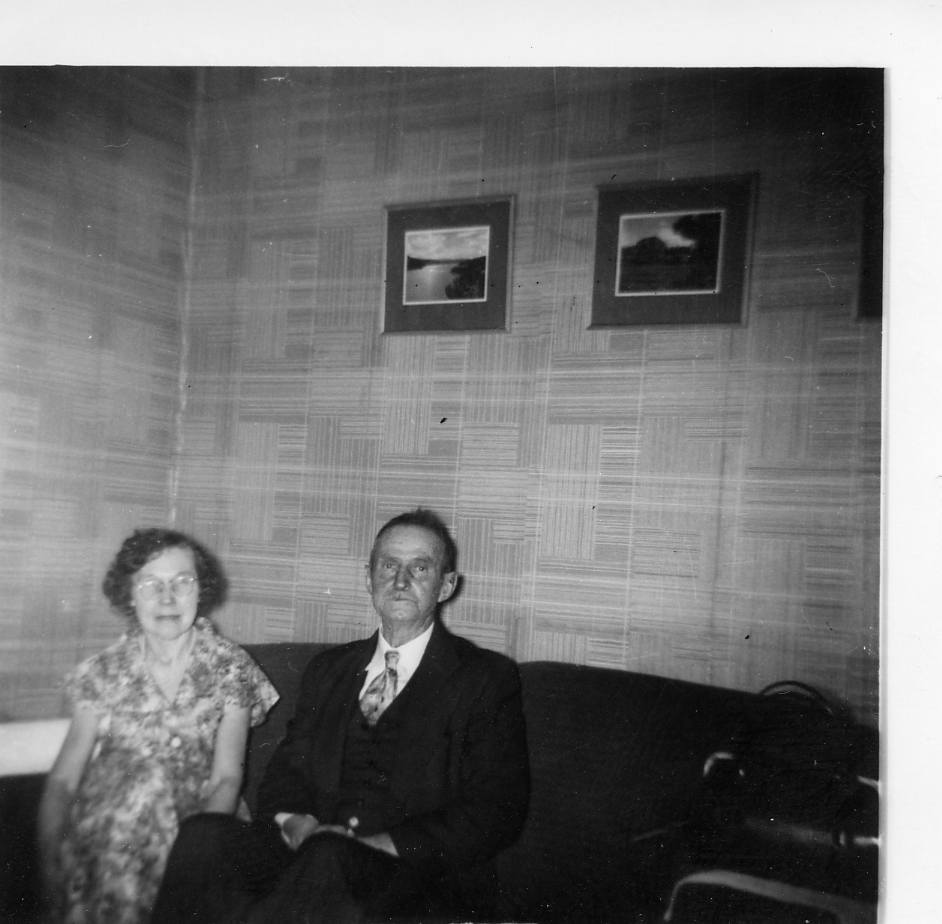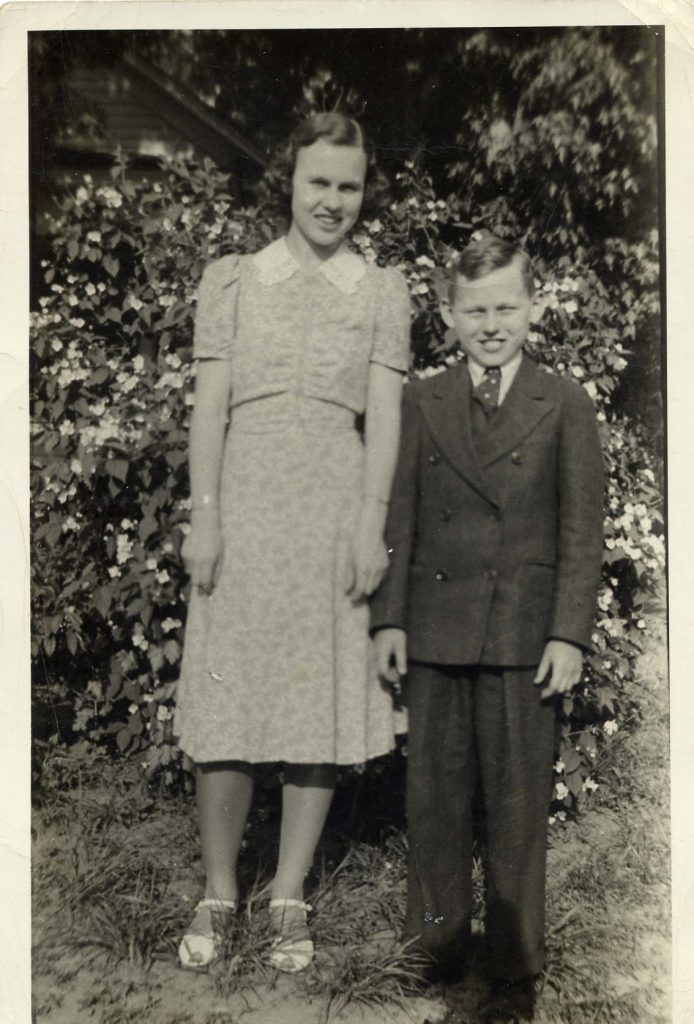
Passco “Pat” R. Peelle was the last Passco in our family line, the last standing Peelle in our family line, and drove the streetcar to the end of the line.
Uncle Pat
 To me Uncle Pat, great-uncle actually but we never made that distinction, was always an old man. Everything about him was old. He looked old, smelled old, and had old things. I remember visiting his home and feeling very uncomfortable, not because Uncle Pat and his wife Aunt Verda weren’t nice to us, but because everything was old. Not a lot seemed to have had a lot of care given to it.
To me Uncle Pat, great-uncle actually but we never made that distinction, was always an old man. Everything about him was old. He looked old, smelled old, and had old things. I remember visiting his home and feeling very uncomfortable, not because Uncle Pat and his wife Aunt Verda weren’t nice to us, but because everything was old. Not a lot seemed to have had a lot of care given to it.
Despite the fact that he looked a bit rough around the edges, he always had a loyal dog or two by his side. And, I can’t remember him being unkind to anyone or anything.
Conversations
After his oldest sister Lydia died, my Grandma, another sister, inherited Lydia’s house. Uncle Pat, whose wife had also died, moved in with Grandma for a while. Interestingly, I don’t remember having a single conversation with him. However, my sister remembers one conversation with him where he told her about an acquaintance of hers coming up to him at the filling station in Arcadia where he hung out and asking if he was related to her. Apparently, the acquaintance had moved to Arcadia, where he lived.
One thing I do know about Uncle Pat i that he was the one that would leak the family secrets. His sisters definitely weren’t going to tell anyone anything bad or risque. They might whisper to each other, but things they thought were not aligned with their upright-uptight English upbringing were not going to be spoken loud enough for a bystander to hear them.
He was also open to telling slightly off-color stories. I am thankful for his stories. If he hadn’t passed on some secrets to members of the family, I would never have known things to research about some of the cousins in the Jury family (Uncle Pat’s mom’s family) to discover their stories . Read about Rebecca and Warren. There were probably some secrets in the Peelle family, too, however, his father William J. Peelle died when Uncle Pat was only 12. So, he didn’t have as many years to learn all the stories of that family.

Last of the “Passco” Name
Uncle Pat, Passco by birth, was the last Passco in our family line. He did have two first cousin with a middle name of Passco – Clayton Passco “Clate” Farmer and Walter Passco Longnecker. Uncle Pat outlived both of them and none of them or any of their siblings/cousins appear to have named a child Passco. However, neither of them were called Passco and both of them died before he did.
The name Passco was a name the family repeated often in multiple descending lines after the first known Passco Peelle, who was born in 1733 in Northhampton County, North Carolina. We don’t know where the name Passco originated. Some researchers believe the first Passco’s name was actually Issac and that he took on Passco as a nickname. This is based on his father’s first will that lists him as Issac. However, I believe the first will was in error as all the records I have found shows some form of the name Passco. It has also shown up in records spelled Pasco, Passcow, Pashal, Pascal, etc.
For Uncle Pat, he was simply named for his grandfather whom lived with his family. He may never have known his name went back over 160 years before his birth.

Last of the Peelle Name
Uncle Pat was the only male of his generation in our specific family line. Thus, he was the only one in our line to carry on the Peelle name. He married Verda (Carson) Albrecht on August 14, 1926 in Hesston, Kansas. She had a daughter Roberta Evelyn (Bobbi) Albrecht, who Uncle Pat adopted.
It was April 13, 1929 before they would welcome their first and only child, a son, Paul Russell Peelle. Life seemed to be going well for the family. In the 1930s and early 1940s, the family lived in Delano Township. It is located just to the west of Old Town on the west side of the Arkansas River.
Delano
In the earlier Cowtown years, the Delano area hadn’t been very suitable for families. It was at the end of the Chisholm Train and was full of saloons and brothels to entertain the weary cowboys. Drinking, gambling, prostitution, and gunfights were part of life in Delano. Even bathing in the nude in the Arkansas River that flowed between Delano and Wichita was quite common.
Across the river, Wichita had laws that prohibited the vices that Delano allowed. However, in 1872, Delano did require that cowboys restrict bathing nude in the river to a nighttime activity (i.e. No running around nude during the day.) However, the saloon maids were allowed to race nude through the streets with bets placed on who would win. Read more about Delano @ http://historicdelano.com/HistoricDelano/history.php
By the time Uncle Pat lived there, Delano had became a part of Wichita and had settled down from the wildness in its early years. Uncle Pat’s kids attended the O.K. School (yes, that is really its name, O.K. stands for nothing just like Uncle Pat’s middle initial stands for nothing). It had its roots back to the 1870s just as the cattle trade was shifting to Dodge City. Since then, it had been rebuilt and expanded multiple times. It was by this time a regular city school with a PTA. At one point his wife Verda served as vice-president of the PTA and he was involved with a play performed at the school.
Disaster Strikes
Thursday, June 12, 1941, Uncle Pat’s life changed forever when his son Paul was in horrible and bizarre bicycle-car accident. Paul was riding his bicycle near his home, which appears to have been right by the O.K. School on north West Street, when the accident occurred. The driver of a car had chains wrapped around his front bumper. Somehow, they loosened and the driver’s side front wheel became entangled in the chain causing the car to veer to the left. The car hit Paul’s bicycle head on at approximately 40 m.p.h.
Paul was rushed to St. Francis Hospital, which was about 4 miles away with critical injuries. Both his legs were broken and he had internal injuries. He died the following night.
 It is said that Uncle Pat lost his interest in life and drive to achieve after he lost his only biological child and the only one who could carry on the family name. At the time of Paul’s death, Uncle Pat was working as a pressman for Inland Printing, a position which he had held for at least 15 years. He seems to have left that job later in 1941 or in 1942.
It is said that Uncle Pat lost his interest in life and drive to achieve after he lost his only biological child and the only one who could carry on the family name. At the time of Paul’s death, Uncle Pat was working as a pressman for Inland Printing, a position which he had held for at least 15 years. He seems to have left that job later in 1941 or in 1942.
In the years following, the family was back and forth between Wichita and Arcadia in Crawford County, Kansas for several years before settling in the Arcadia area. I assume depression and/or a desire to leave the city that reminded the family of their loss drove them to leave Wichita. I do not, however, know what attracted them to Arcadia. It wasn’t a great distance from his sister Nellie. Yet, it wasn’t a logical place to live if he wanted to be near her.
The remaining years of his work life were spent primarily as a farmer and a miner.
The Key

Sometime during his time in Wichita, Uncle Pat drove a streetcar. It is unclear exactly when he drove it or how long he was a streetcar driver. However, it was likely in the first half of the 1920s unless he had a second job while working at the printing company. This is possible as he is listed in one city directory as both a pressman for Inland Printing and as a clerk.
The Wichita Railroad & Light Co., had a streetcar system in Wichita. Uncle Pat could have worked for them. Since I haven’t found proof of the company that employed him, I speculate that it wasn’t the streetcar system within WIchita that hired him. Instead, it seems likely that he was working for the Arkansas Valley Interurban Railway. It was considered an electric streetcar. However, it traveled between Wichita, Newton, and Hutchinson.
Why do I think Uncle Pat worked for the latter company? His wife Verda lived in Newton for about 15 years when they married. After she divorced her first husband, who had abandoned her and their daughter Roberta, Verda worked at Anderson’s Bookstore in Newton. It seems likely that he could have had a break while in Newton and wandered into the bookstore or had some other chance meeting. This is very likely given the rail station was at 5th and Main and the bookstore was at 422-424 Main. Of course, it is also possible that they met when she took the streetcar into the city (Wichita).
The streetcar key looks completely different than an automobile key and has a totally different function. It didn’t turn on the streetcar. Instead, it was used when the streetcar got to the end of the line to reverse direction of the streetcar.